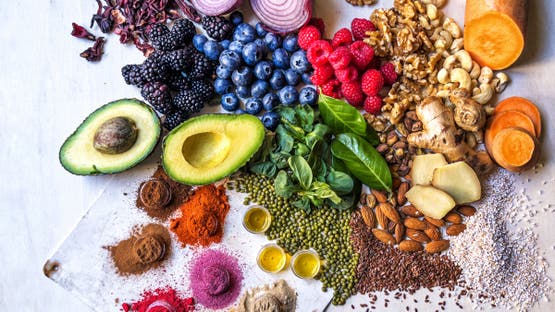Foods helps to sleep
- YAQOOPKING الاحمدي

- Oct 24, 2025
- 2 min read
There are several foods that contain natural compounds to help promote relaxation and sleep. These foods don't typically have a strong sedative effect but rather support the body's natural sleep processes.
Key nutrients that help include:
Tryptophan: An amino acid that the body uses to produce serotonin, which is then converted into the sleep-regulating hormone melatonin.
Melatonin: The hormone that controls the sleep-wake cycle (circadian rhythm). It's found naturally in some foods.
Magnesium and Potassium: Minerals that help relax muscles and calm the nervous system.
Complex Carbohydrates: These can help make tryptophan more available to the brain and stabilize blood sugar for solid sleep.
Here are some foods and drinks that quietly help you fall asleep:
Fruits & Juices
Tart Cherries or Tart Cherry Juice: One of the few natural food sources of melatonin, which helps regulate your sleep cycle.
Bananas: Contain both tryptophan, and the muscle-relaxing minerals potassium and magnesium.
Kiwis: High in serotonin and antioxidants, and some studies link eating them before bed to improved sleep quality and duration.
Almonds & Pistachios: These nuts are sources of both melatonin and magnesium.
Dairy & Protein
Warm Milk: Contains tryptophan and calcium, which is needed to process melatonin. The warmth can also be soothing.
Yogurt or Low-Fat Cottage Cheese: Good sources of protein (with tryptophan) and calcium. Pair with a complex carb like whole-grain crackers.
Turkey, Chicken, or Fish: Lean proteins that are excellent sources of tryptophan.
Grains & Seeds
Oatmeal: A source of complex carbohydrates, which can aid in the release of tryptophan, and it naturally contains melatonin.
Whole-Grain Crackers or Bread: Pair with cheese, nut butter, or lean protein to provide a complex carb that helps make tryptophan available to the brain.
Pumpkin and Sesame Seeds: Rich in both tryptophan and magnesium.
Drinks & Herbs
Chamomile Tea: Contains an antioxidant called apigenin, which may bind to receptors in the brain that promote sleepiness.
Herbal Teas (e.g., Peppermint, Lemon Balm): Can be calming and the warm ritual helps signal to your body it's time to wind down.
Tips for Bedtime Snacking:
Keep it light: A small snack is better than a large, heavy meal, which can cause discomfort and disrupt sleep.
Eat in advance: Finish your snack or meal at least an hour before you plan to go to sleep.
Combine nutrients: A good bedtime snack often pairs a source of tryptophan (like lean protein or nuts) with a complex carbohydrate (like whole-grain crackers or a banana) to boost the sleep-promoting effect.





Comments